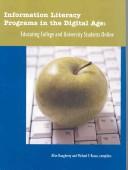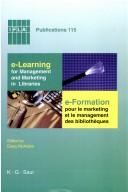| Listing 1 - 9 of 9 |
Sort by
|
Book
ISBN: 1476624410 Year: 2016 Publisher: Jefferson, North Carolina : McFarland & Company, Inc., Publishers,
Abstract | Keywords | Export | Availability | Bookmark
 Loading...
Loading...Choose an application
- Reference Manager
- EndNote
- RefWorks (Direct export to RefWorks)
"Focusing on academic libraries and librarians who are extending the boundaries of e-learning, this collection of essays presents new ways of using information and communication technologies to create learning experiences for a variety of user communities. Contributors describe the process of project development, from determination of need, to exploration of tools, project design and user assessment"--
Libraries and distance education. --- Academic libraries. --- Internet in education.
Book
ISBN: 9780786496426 9781476624419 1476624410 Year: 2016 Publisher: Jefferson, N.C. McFarland & Company, Inc., Publishers
Abstract | Keywords | Export | Availability | Bookmark
 Loading...
Loading...Choose an application
- Reference Manager
- EndNote
- RefWorks (Direct export to RefWorks)
"Focusing on academic libraries and librarians who are extending the boundaries of e-learning, this collection of essays presents new ways of using information and communication technologies to create learning experiences for a variety of user communities. Contributors describe the process of project development, from determination of need, to exploration of tools, project design and user assessment"--
Book
ISBN: 9781574403923 1574403923 Year: 2015 Publisher: [New York, New York] : Primary Research Group Inc.,
Abstract | Keywords | Export | Availability | Bookmark
 Loading...
Loading...Choose an application
- Reference Manager
- EndNote
- RefWorks (Direct export to RefWorks)

ISBN: 0838984444 Year: 2007 Publisher: Chicago American library association. Association of college and research libraries
Abstract | Keywords | Export | Availability | Bookmark
 Loading...
Loading...Choose an application
- Reference Manager
- EndNote
- RefWorks (Direct export to RefWorks)
Book
ISBN: 9781442252936 9781442252943 9781442252950 1442252952 1442252936 1442252944 Year: 2015 Volume: 2 Publisher: Lanham: Rowman & Littlefield,
Abstract | Keywords | Export | Availability | Bookmark
 Loading...
Loading...Choose an application
- Reference Manager
- EndNote
- RefWorks (Direct export to RefWorks)
MOOCs or massive open online courses that can be attended by hundreds of thousands of students at the same time have become wildly popular in recent years, and have begun to gain traction with libraries as well. There are many potential roles for libraries in MOOCs including: development, support, assessment, modeling, teaching, and preservation. In MOOCs and Libraries, learn how you can utilize MOOCs for staff training, bibliographic instruction, supporting faculty curriculum, and more! Readers of this start-to-finish guide to MOOC's in libraries will learn all about MOOC creation, from early stage planning, pedagogy, and equipment selection, to filming and launch, including: *How to Choose Hardware and Software for Your MOOC *Planning your first MOOC project *Planning for a Library MOOC Video Project *How to Develop MOOC Scripts *Storyboarding *Choosing a MOOC Filming Location *How to create MOOCs for bibliographic instruction *How to create MOOCs for staff training *How to create video lectures and screencasts
Audiovisual methods --- bibliotheekautomatisering --- Library automation --- leermiddelen --- MOOCs (Web-based instruction) --- Library orientation --- Library employees --- Libraries and distance education. --- Cours en ligne ouverts à tous dans les bibliothèques --- Bibliothèques --- Bibliothèques et enseignement à distance --- Library applications --- Web-based instruction. --- In-service training --- Web-based instruction --- Formation des usagers --- Enseignement sur le Web --- Personnel --- Formation en cours d'emploi --- Libraries and distance education --- Cours en ligne ouverts à tous dans les bibliothèques --- Bibliothèques --- Bibliothèques et enseignement à distance --- MOOC (massive open online courses) --- Library applications.
Book
ISBN: 1442252952 1442252936 1442252944 9781442252943 Year: 2015 Publisher: Lanham [Maryland] : Rowman & Littlefield,
Abstract | Keywords | Export | Availability | Bookmark
 Loading...
Loading...Choose an application
- Reference Manager
- EndNote
- RefWorks (Direct export to RefWorks)
In MOOCs and Libraries, learn how you can utilize MOOCs (massive open online courses) for staff training, bibliographic instruction, supporting faculty curriculum, and more!
MOOCs (Web-based instruction) --- Library orientation --- Library employees --- Libraries and distance education. --- Library applications. --- Web-based instruction. --- In-service training --- Distance education and libraries --- Library services for distance education --- Distance education --- Libraries --- Library staff --- Library personnel --- Employees --- Bibliographic instruction --- Libraries and readers --- Library instruction --- Library user orientation --- Orientation (Library use) --- Information services --- Instruction librarians --- Instructional materials centers --- Programmed instruction --- User education --- MOOCs (Web-based instruction) - Library applications --- Library orientation - Web-based instruction --- Library employees - In-service training - Web-based instruction --- Libraries and distance education
Book
ISBN: 9781843343462 9781780631851 1780631855 1843343460 9781843343479 1843343460 1843343479 1306213142 Year: 2010 Publisher: Oxford: Chandos,
Abstract | Keywords | Export | Availability | Bookmark
 Loading...
Loading...Choose an application
- Reference Manager
- EndNote
- RefWorks (Direct export to RefWorks)
In a world where computing power, ubiquity and connectivity create powerful new ways to facilitate learning, this book examines how librarians and information professionals can utilize emerging technologies to expand service and resource delivery. With contributions from leading professionals, including lecturers, librarians and e-learning technologists, this bookl explores strategic approaches for effectively implementing, living with, and managing revolutionary technological change in libraries.Explores the impact of the social and technological aspects of Web 2.0 on librarie
Library automation --- Libraries and the Internet --- Library information networks --- Libraries and distance education --- Library Web sites --- Libraries and the Internet. --- Library information networks. --- Libraries and distance education. --- Library Web sites. --- Digital libraries. --- Information commons --- Bibliothèques et Internet. --- Bibliothèques --- Bibliothèques numériques. --- Carrefours de l'information et de l'apprentissage. --- Enseignement à distance. --- Réseaux d'information. --- Bibliothèques et Internet --- Réseaux de bibliothèques --- Bibliothèques et enseignement à distance --- Sites Web de bibliothèques --- 020 --- 028.7 --- 028.7 Information literacy --- Information literacy --- Web sites --- Web librarianship --- Information networks, Library --- Libraries --- Library networks --- Networks of libraries --- Data transmission systems --- Information networks --- Library cooperation --- Internet and libraries --- Internet --- Distance education and libraries --- Library services for distance education --- Distance education --- Computer networks --- Bibliothèques et Internet. --- Bibliothèques --- Bibliothèques numériques. --- Enseignement à distance. --- Réseaux d'information.
Book
ISBN: 9781843347415 9781780634074 1780634072 1843347415 1322078602 9781322078601 Year: 2014 Publisher: Oxford, England : Elsevier : Chandos Publishing,
Abstract | Keywords | Export | Availability | Bookmark
 Loading...
Loading...Choose an application
- Reference Manager
- EndNote
- RefWorks (Direct export to RefWorks)
The design philosophies of Google and Apple represent different approaches to new product design. Google's model features bottom-up and data-driven decision-making processes, while Apple's model is to design and build products top-down. Library instruction program design may learn from these differing but complementary approaches. Inspired by Google’s and Apple’s success, Library Instruction Design details how library instruction program design may learn from the philosophy of product design in the business world. In designing library instruction, a Google-philosophy approach teaches what the user wants to know while an Apple-philosophy approach teaches what the librarian thinks the user needs to learn. These two design philosophies aim at different teaching objectives reflecting library and information science education in modern society. The book is divided into five sections, with opening sections covering library instruction, the philosophy of library instruction design and design philosophy from different angles. Later sections discuss applying Google’s model and applying Apple’s model. Offers a creative way to think about library instruction program design Suggests two design approaches grounded in two philosophies, represented by the design approaches of Google and Apple Details the differences and complementarities between top-down and bottom-up approaches to design
Information user --- Library orientation. --- Information services --- Libraries and distance education. --- User education. --- Library orientation --- Information services instruction --- Orientation (Information services) --- User education (Information science) --- Information science --- Bibliographic instruction --- Libraries and readers --- Library instruction --- Library user orientation --- Orientation (Library use) --- Instruction librarians --- Instructional materials centers --- User education --- Study and teaching --- Programmed instruction --- E-books --- 02 --- Library science --- Distance education and libraries --- Library services for distance education --- Distance education

ISBN: 3598218435 9786613403377 3598440154 1283403374 9783598440151 9783598218439 Year: 2005 Volume: 115 Publisher: München: Saur,
Abstract | Keywords | Export | Availability | Bookmark
 Loading...
Loading...Choose an application
- Reference Manager
- EndNote
- RefWorks (Direct export to RefWorks)
The contributions to the conference held in Geneva in 2003, focus on the very latest approaches to 'e-Learning'. The power and enormous diversity of this medium, becomes apparent as experts from all over the world compare notes and raise a whole new range of issues. The reader can examine the presentations of the various practitioners, or go straight to the discussions at the end, for insights into what the future holds for teachers and students alike.
Distance education. --- training programmes --- Internet dans l'enseignement --- Internet in het onderwijs --- Internet in education. --- Libraries --- Documentation --- Public institutions --- Librarians --- Distance learning --- Education --- Open learning --- Telecommunication in education --- Internet (Computer network) in education --- Marketing --- Computer assisted instruction --- Library automation --- Library management --- library sciences --- Information retrieval --- Vocational training --- Teaching methods --- Internet --- Library administration --- Library education --- Internet in education --- Library science --- Distance education --- Bibliothèques --- Bibliothéconomie --- Internet en éducation --- Enseignement à distance --- Computer-assisted instruction --- Computer network resources --- Administration --- Enseignement assisté par ordinateur --- Etude et enseignement --- Information électronique --- Congresses --- Libraries and distance education --- Libraries - Marketing - Congresses.
| Listing 1 - 9 of 9 |
Sort by
|

 Search
Search Feedback
Feedback About UniCat
About UniCat  Help
Help News
News